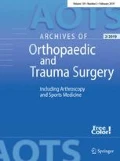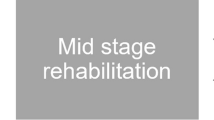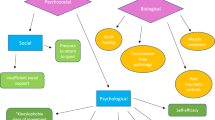Abstract
Introduction
Anterior cruciate ligament (ACL) injuries are more common among female athletes compared to male athletes. Several studies have been reported to explain the gender difference in ACL injury rates and several risk factors underlying gender disparity are believed to exist. Hormonal effects are considered to be one of the etiological factors for female non-contact ACL injuries. The objectives of this study were to determine if ACL injuries occurred randomly or correlated with a specific phase of the female menstrual cycle in teenaged female athletes and then to determine if pre-menstrual and menstrual dysfunctions influenced these ACL injuries.
Materials and methods
Eighteen of 37 consecutive female athletes, with ACL injuries, met the study criteria: teenage, with regular menstrual cycle, and non-contact injury. The menstrual history, athletic activity, and injury history were collected.
Results
Seventy-two percent of the subjects had premenstrual symptoms and 83% had menstrual symptoms. The subjective activity level at the follicular phase was significantly lowest between the phases. A significant statistical association was found between the phase of the menstrual cycle and ACL injuries (P = 0.0002). There were more injuries in the ovulatory phase than expected, and fewer injuries occurred in the other phases.
Conclusion
The results showed a significant increase in non-contact ACL injuries in teenage female athletes during the ovulatory phase of the menstrual cycle and the subjective activity level and the premenstrual and menstrual symptoms might not affect the likelihood of the injuries. These findings suggest that sex hormones might play a role in the incidence of female non-contact ACL injuries.

Similar content being viewed by others
References
Arendt E, Bershadsky B, Agel J (2002) Periodicity of noncontact anterior cruciate ligament injuries during the menstrual cycle. J Gend Specif Med 5(2):19–26
Backstrom T, Baird DT, Bancroft J, Bixo M, Hammarback S, Sanders D, Smith S, Zetterlund B (1983) Endocrinological aspects of cyclical mood changes during the menstrual cycle or the premenstrual syndrome. J Psychosom Obset Gynaecol 2(1):8–20
Beynnon BD, Berstein IM, Belisle A, Brattbakk B, Devanny P, Risinger R, Durant D (2005) The effect of estradiol and progesterone on knee and ankle joint laxity. Am J Sports Med 33(9):1298–1304
Beynnon BD, Johnson RJ, Braun S, Sargent M, Berstein IM, Skelly JM, Vacek PM (2006) The relationship between menstrual cycle phase and anterior cruciate ligament injury. A case control study of recreational alpine skiers. Am J Sports Med 34(5):757–764
Deie M, Sakamaki Y, Sumen Y, Urabe Y, Ikuta Y (2002) Anterior knee laxity in young women varies with their menstrual cycle. Int Orthop 26:154–156
Eiling E, Bryant AL, Peterson W, Murphy A, Hohmann E (2007) Effect of menstrual-cycle hormone fluctuations on musculotendinous stiffness and knee joint laxity. Knee Surg Sports Traumatol Arthrosc 15:126–132
Espey LL, Halim IA (1990) Characteristics and control of the normal menstrual cycle. Obstet Gynecol Clin North Am 17(2):275–298
Fischer GM (1973) Comparison of collagen dynamics in different tissues under the influence of estradiol. Endocrinology 93:1216–1218
Friden C, Hirschberg AL, Saartok T, Backstrom T, Leanderson J, Renstrom P (2003) The influence of premenstrual symptom on postural balance and kinesthesia during the menstrual cycle. Gynecol Endocrinol 17(6):433–439
Friden C, Ramsey DK, Backstrom T, Benoit DL, Saartok T, Hirschberg AL (2005) Altered postural control during the luteal phase in women with premenstrual symptoms. Neuroendocrinology 81(3):150–157
Friden C, Hirschberg AL, Saartok T, Renstrom P (2006) Knee joint kinaesthesia and neuromuscular coordination during three phases of the menstrual cycle in moderately active women. Knee Surg Sports Traumatol Arthrosc 14(4):383–389
Griffin LA, Albohm MJ, Arendt EA, Bahr R, Beynnon BD, DeMaio M, Dick RW, Engebretsen L, Garrett WE, Hannafin JA, Hewett TE, Huston LJ, Ireland ML, Johnson RJ, Lephart S, Mandelbaum BR, Mann BJ, Marks PH, Marshall SW, Myklebust G, Noyes FR, Powers C, Shields C, Shultz SJ, Silvers H, Slauterbeck J, Taylor DC, Teitz CC, Wojtys EM, Yu B (2006) Understanding and preventing noncontact anterior cruciate ligament injuries. A review of the Hunt Valley II meeting, January 2005. Am J Sports Med 34(9):1512–1532
Hama H, Yamamuro T, Takeda T (1976) Experimental studies on connective tissue of the capsular ligament. Influences of aging and sex hormones. Acta Orthop Scand 47(5):473–479
Heitz NA, Eisenman PA, Beck CL, Walker JA (1999) Hormonal changes throughout the menstrual cycle and increased anterior cruciate ligament laxity in females. J Athl Train 34(2):144–149
Hertel J, Williams NI, Olmsted-Kramer LC, Leidy HJ, Putukian M (2006) Neuromuscular performance and knee laxity do not change across the menstrual cycle in female athletes. Knee Surg Sports Traumatol Arthrosc 14:817–822
Hewett TE, Myer GD, Ford KR (2006) Anterior cruciate ligament injuries in female athletes. Part 1, mechanisms and risk factors. Am J Sports Med 34(2):299–311
Hewett TE, Zazulak BT, Myer GD (2007) Effect of the menstrual cycle on anterior cruciate ligament injury risk. A systematic review. Am J Sports Med 35(4):659–668
Karageanes SJ, Blackburn K, Vangelos ZA (2000) The association of the menstrual cycle with the laxity of the anterior cruciate ligament in adolescent female athletes. Clin Sports Med 10:162–168
Landgren BM, Unden AL, Diczfalusy E (1980) Hormonal profile of the cycle in 68 normally menstruating women. Acta Endcrinol 94:89–98
Lebrun CM (1994) The effect of the phase of the menstrual cycle and the birth control pill on athletic performance. Clin Sports Med 13(2):419–441
Liu SH, Al-Shaikh R, Panossian V, Yang R, Nelson SD, Soleiman N, Finerman GAM, Lane JM (1996) Primary immunolocalization of estrogen and progesterone target cells in the human anterior cruciate ligament. J Orthop Res 14(4):526–533
Lloyd T, Triantafyllou SJ, Baker ER, Houts PS, Whiteside JA, Kalenak A, Stumpf PG (1986) Women athletes with menstrual irregularity have increased musculoskeletal injuries. Med Sci Sports Exerc 18(4):374–379
Malone TR, Hardaker WT, Garrett WE, Feagin JA, Bassett FH (1993) Relationship of gender to anterior cruciate ligament injuries in intercollegiate basketball players. J South Orthop Assoc 2(1):36–39
Moller-Nielson J, Hammar M (1989) Women’s soccer injuries in relation to the menstrual cycle and oral contraceptive use. Med Sci Sports Exerc 21(2):126–129
Moller-Nielson J, Hammar M (1991) Sports injuries and oral contraceptive use. Is there a relationship? Sports Med 12(3):152–161
Myklebust G, Maehlum S, Holm I, Bahr R (1998) A prospective cohort studies of anterior cruciate ligament injuries in elite Norwegian team handball. Scand J Med Sci Sports 8:149–153
Samuel CS, Butkus A, Coghlan JP, Bateman JF (1996) The effect of relaxin on collagen metabolism in the nonpregnant rat pubic symphysis: the influence of estrogen and progesterone in regulating relaxin activity. Endocrinology 137(9):3884–3890
Sanborn CF (1989) Menstrual dysfunction in the female athlete. In: Teiz CC (ed) Scientific foundations of sports medicine. BC Decker, Philadelphia, pp 117–134
Slauterbeck JR, Fuzie SF, Smith MP, Clark RJ, Xu KT, Starch DW, Hardy DM (2002) The menstrual cycle, sex hormones, and anterior cruciate ligament injury. J Athl Train 37(3):275–280
Shultz SJ, Kirk SE, Johnson ML, Sander TC, Perrin DH (2004) Relationship between sex hormones and anterior knee laxity across the menstrual cycle. Med Sci Sports Exerc 36:1165–1174
Shultz SJ, Sander TC, Kirk SE, Perrin DH (2005) Sex differences in knee joint laxity change across the female menstrual cycle. J Sports Med Phys Fitness 45(4):594–603
Shultz SJ, Gansneder BM, Sander TC, Kirk SE, Perrin DH (2005) Absolute serum hormone levels predict the magnitude of change in anterior knee laxity across the menstrual cycle. J Orthop Res 24(2):124–131
Van Lunen BL, Roberts J, Branch D, Dowling EA (2003) Association of menstrual-cycle hormone changes with anterior cruciate ligament laxity measurements. J Athl Train 38(4):298–303
Woitys EM, Huston LJ, Lindenfeld TN, Hewett TE, Greenfield MLVH (1998) Association between the menstrual cycle and anterior cruciate ligament injuries in female athletes. Am J Sports Med 26(5):614–619
Woitys EM, Huston LJ, Boynton MD, Spindler KP, Lindenfeld (2002) The effect of the menstrual cycle on anterior cruciate ligament injuries in women as determined by hormone levels. Am J Sports Med 30(2):182–188
Yu WD, Liu SH, Hatch JD, Panossian V, Finerman GAM (1999) Effect of estrogen on cellular metabolism of the human anterior cruciate ligament. Clin Orthop Relat Res 366:229–238
Yu WD, Panossian V, Hatch JD, Liu SH, Finerman GAM (2001) Combined effects of estrogen and progesterone on the anterior cruciate ligament. Clin Orthop Relat Res 383:268–281
Zuzulak BT, Paterno M, Myer GD, Roman WA, Hewett TE (2006) The effects of the menstrual cycle on anterior knee laxity. A systematic review. Sports Med 36(10):847–862
Zazulak BT, Hewett TE, Reeves NP, Goldberg MB, Cholewicki J (2007) The effects of core proprioception on knee injury. A prospective biomechanical–epidemiological study. Am J Sports Med 35(3):368–373
Author information
Authors and Affiliations
Corresponding author
Rights and permissions
About this article
Cite this article
Adachi, N., Nawata, K., Maeta, M. et al. Relationship of the menstrual cycle phase to anterior cruciate ligament injuries in teenaged female athletes. Arch Orthop Trauma Surg 128, 473–478 (2008). https://doi.org/10.1007/s00402-007-0461-1
Received:
Published:
Issue Date:
DOI: https://doi.org/10.1007/s00402-007-0461-1




